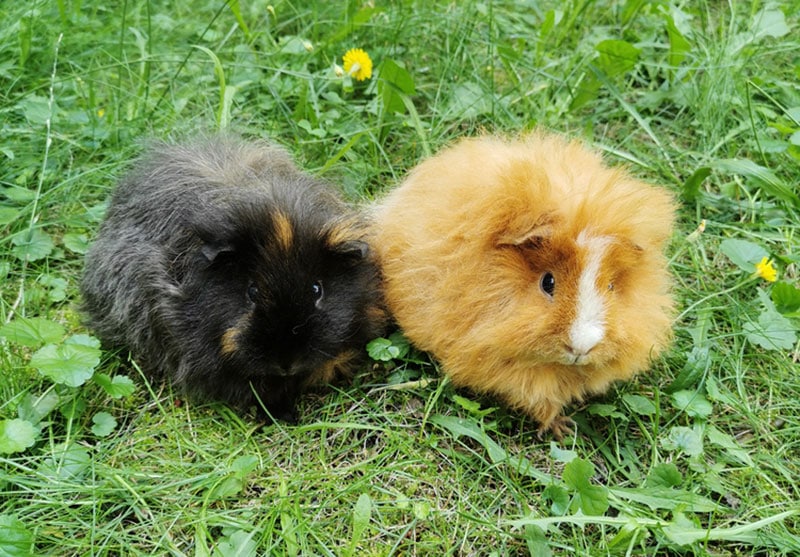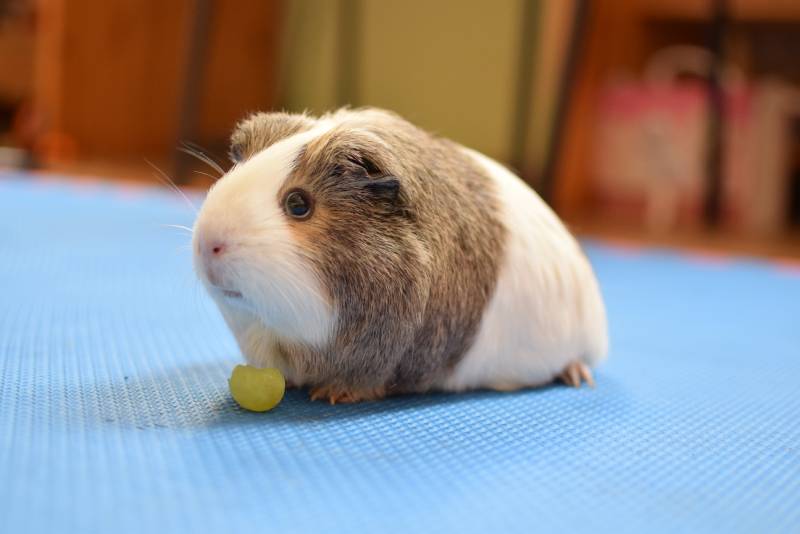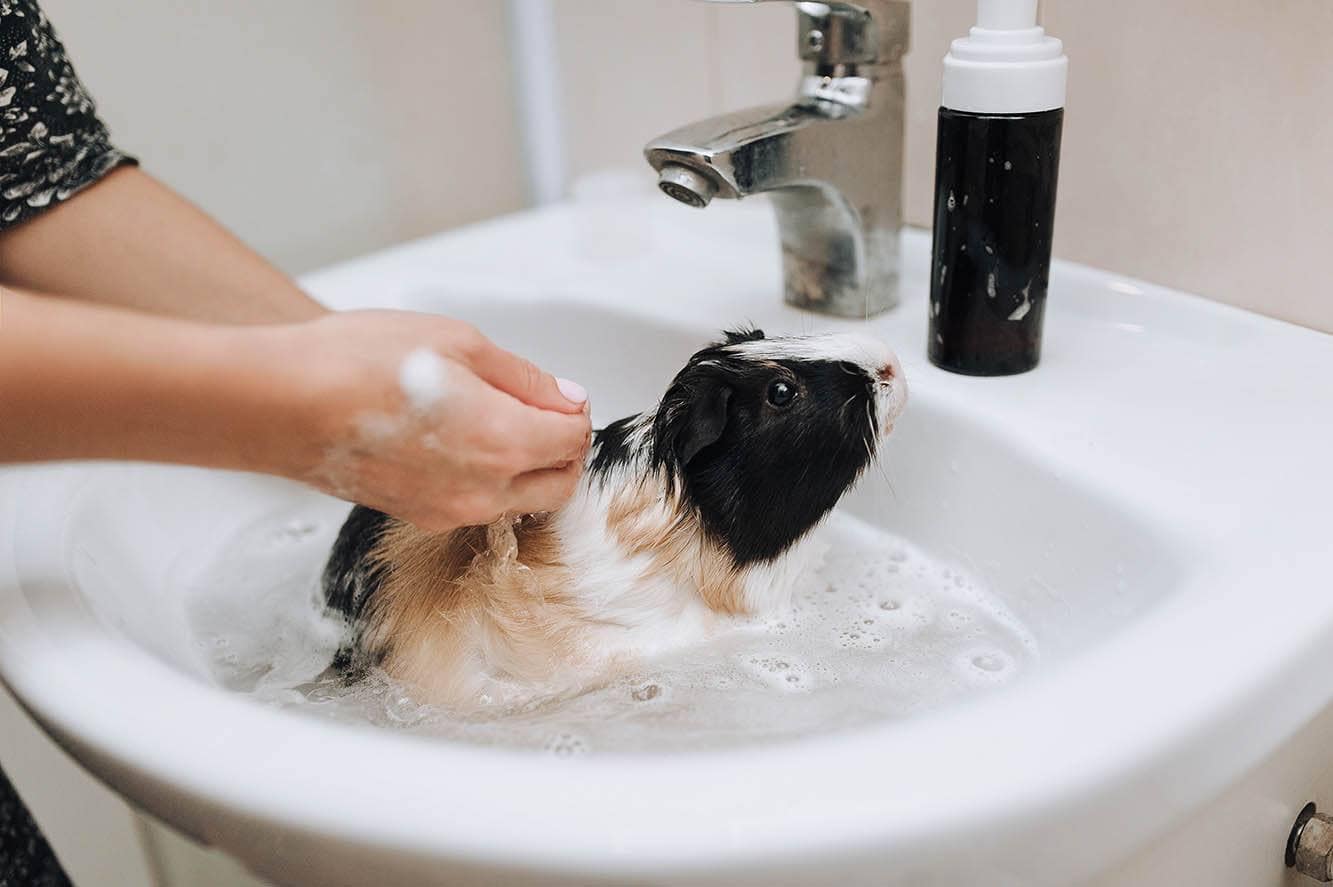
Click to Skip Ahead
For caring guinea pig parents, picking the right foods to make up a safe and healthy diet for your furry, squeaky friend is of paramount importance. So, you’re here because you’re unsure whether or not your guinea pig can eat rosemary. Luckily, rosemary is a safe herb for guinea pigs among many others, but your guinea pig’s diet should be varied and include a wide range of other vegetables and herbs.
In this guide, we’ll share more information on which foods contribute to keeping your guinea pig healthy and in what quantities they should be fed.
What Do Guinea Pigs Eat?
Guinea pigs are herbivorous, which means they require a diet made up solely of plant matter—no meat. In the wild, guinea pigs forage for their food, mostly grass, weeds and other plants. Therefore, domestic guinea pigs should be provided hay (like timothy hay) and grass (not lawn cuttings), which should make up the most part of their diet: 85–90% to be more precise.
Guinea pigs need hay and grass because it’s a great source of fiber and helps keep their digestive systems running as they should. It also allows your guinea pig to chew and wear down their teeth naturally, which is very important for these animals. Furthermore, since foraging and burrowing are important behaviors for guinea pigs in the wild, the hay you offer provides them with a place to hide and feel safe and mental enrichment.
In addition to hay and grass, guinea pigs can be fed various greens and vegetables. Vets from the PDSA recommend offering a teacup’s worth of varied greens and vegetables for each guinea pig on a daily basis. To prevent the greens from spoiling over the course of the day, you can try offering half the cup in the morning and the other half in the evening.
You can also feed guinea pig pellets (a tablespoon per day for adults, as recommended by PDSA vets), but these should only make up a small part of your guinea pig’s overall diet. It’s best to avoid colorful guinea pig mixes that look similar to muesli. These are commercially sold, but they’re not good for guinea pigs due to their high sugar, low fiber content and selective feeding.
Finally, fresh water should always be available. It’s best to provide this via a guinea pig water bottle to keep the water clean—it’s easy for guinea pigs to tip over bowls of water or get food in them. Just be sure to make sure the water is coming out of the bottle’s tube (they can sometimes get blocked) and that you clean the bottle every day.

Safe Greens for Guinea Pigs
PDSA Vets recommend feeding 5–6 different types of greens each day for the best nutritional balance and, of course, to offer some variety. At least some of the greens you offer should be high in vitamin C since guinea pigs’ systems can’t make vitamin C, so we need to make sure they get it from food sources. You can however over do the vitamin C so balance is key. Rosemary contains a lot of vitamin C and should be limited to small portions on occasion. Here are some safe vegetables and herbs your guinea pig can eat:
Safety tip: Avoid overindulging your guinea pig with greens as this may upset their stomach.
Herbs for Guinea Pigs
Vegetables for Guinea Pigs
Tip: Avoid feeding iceberg lettuce to your guinea pig as it’s not very nutritious for them.
Can Guinea Pigs Eat Fruit?

Yes, but only as a treat now and again, and the amount of fruit you offer should be minimal. Fruit is high in sugar and can cause digestive upset resulting in diarrhea in addition to being bad for your guinea pig’s health. Too many fruits could also cause your guinea pig to pile on the pounds due to the high sugar content. The following fruits are safe in very small amounts from time to time:
Conclusion
To recap, guinea pigs can certainly eat rosemary in addition to a broad variety of other greens and vegetables. Nevertheless, guinea pigs shouldn’t be fed the same kinds of vegetables every day. It’s best to provide various types of vegetables and rotate them regularly to help your guinea pig benefit from a wide range of nutrients and enjoy a versatile diet that they don’t get bored with.
On a final note, it’s important to introduce new foods gradually to prevent your guinea pig from experiencing an upset stomach. You can do this by adding foods your guinea pig isn’t used to their regular food in small amounts at first, gradually building up to the full amount over a couple of weeks.
See Also:
- Can Guinea Pigs Eat Honeydew? Vet-Approved Benefits & Risks
- Can Guinea Pigs Eat Rose Petals? Vet Reviewed Facts & FAQ
Featured Image Credit: HansLinde, Pixabay








